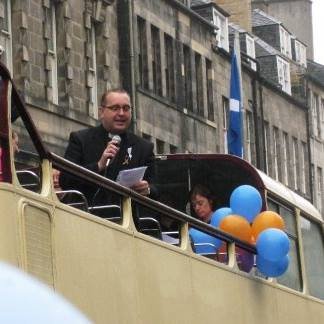I’ve got an article in The Herald newspaper this morning ahead of tomorrow’s Pride March in Glasgow. This is what it says:
Agenda: I’ll march with Pride at our achievements but there is still a long way to go
This weekend, I’ll be marching through Glasgow in a black clerical suit and dog collar amongst a sea of rainbows as I take my place in the Pride March.
There’s a huge amount to celebrate this year, not least the way marriage equality is sweeping the world. It is an idea whose time has come. However, there are a lot of areas where change still needs to come.
The truth is, marriage law reform is not enough to achieve equality and it isn’t as though we’ve actually achieved equal marriage yet in Scotland either. Most religious people who happen to be gay still cannot get married in their own chosen church or other place of worship. The law may have changed, as have social attitudes, but there are still plenty of institutions that discriminate directly against people like me.
The next steps are easy to foresee but they won’t happen automatically. We need individuals to continue to stand up against prejudice when they see it. We need the major equality organisations to understand how much remains to be done, particularly in areas touched by religion. We need political parties to continue to consult about the next steps in changing the law.
The most obvious area where a further change in the law could make a difference is in respect of charity law. It simply shouldn’t be the case in a modern Scotland that any group can be a charity, with all the tax breaks that implies, and campaign or discriminate against lesbian, gay, transgender and bisexual (LGBT) people. Yet religious charities can do exactly that. Charities that tried to campaign against people because of their race would be utterly unacceptable in society even though that was once justified on religious grounds. The same change needs to happen in respect of all charities, religious and otherwise; no exemptions, no get-out clauses, no discrimination full stop. Why should any citizens have to live with so-called charitable organisations getting tax-breaks to campaign against their wellbeing?
Religion remains one of the areas where even the pro-equality organisations fear to tread. Yet equality will not ultimately be won in wider society until it has been won in even the most intransigent institutions. Campaigning organisations have helped to remove or at least significantly lessen prejudice and discrimination in so many unlikely institutions: the military, the police, the fire service, and so many workplaces have changed hugely for LGBT people. Their work cannot be completed until religious institutions have changed too.
Fortunately, the religious scene is beginning to change. The views of people in the pews of most of our institutions are converging around the acceptance of same-sex relationships. However, institutionally there is much to do and there’s a particular need for many in leadership positions to articulate publicly the support they have been happy to give to gay colleagues in private for years.
There will be many who share my view that no school, religious or otherwise, should have access to public money unless it is not merely tolerating gay staff and gay pupils but actively encouraging them to thrive. Education policy needs to catch up with public opinion. Conversations between government and the faith-school sector need to be both robust and challenging.
One of the most bizarre claims that we heard in the debate about marriage is that allowing same-sex couples access to marriage would somehow imperil the married lives of straight couples. Such nonsense was as likely to come to pass as the claims that hurricanes and earthquakes would follow on from strengthening gay rights.
In fact, there are areas of society where campaigning to improve things for LGBT people will lead to supporting marriage rather than threatening it. LGBT people are disproportionately and adversely affected by poor sex education in schools, for example, but that area of education is becoming a crisis for all pupils. Most young people learn about sex from pornography. If we want them to learn something different then it means parents working with schools to produce much better age-appropriate sex education using some of the successful models found on the continent. Such education will be much more explicit and come much earlier. It will also be much more effective leading to better life choices, happier people and fewer teenage pregnancies.
I’ll join the march this weekend with a strong sense of Pride in what we’ve achieved but also a strong yearning for the changes that we’re yet to bring about.
The Very Rev Kelvin Holdsworth is Provost of St Mary’s Cathedral, Glasgow

Recent Comments